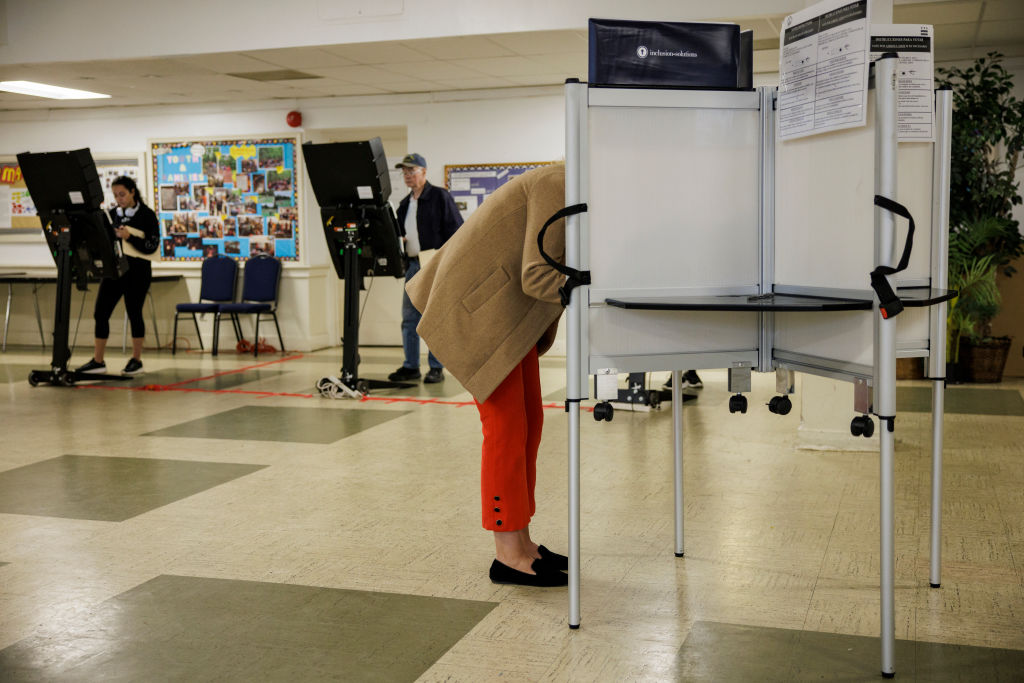I’m a registered Republican in Florida yet the only email offer I received to be a campaign volunteer this season was from the Democrats. Is this a function of Google subverting my Gmail inbox or Republican dysfunction? I have no idea, but I was surprised to get a message on November 4 from “Official Democratic Headquarters” asking me to make phone calls on behalf of Democratic candidates. “With so much on the ballot this Tuesday — from Social Security and Medicare to reproductive freedom and even the future of our democracy — we need all hands-on deck to help Democrats win across the country,” the message read.
Even though I strongly oppose the Democratic agenda, I thought it might be interesting to talk to voters and see how they planned to vote and what was on their minds. I reckoned that someone at the “Official Democratic Headquarters” would screen me out — after all, a simple Google search of my name would out me as a conservative. But my concern proved to be unfounded. I clicked a button in the email, scheduled a couple of shifts, and then was virtually ushered onto a Zoom call on my first day, a day before the election, with thirty-one other volunteers who’d signed up for a shift.
My fellow volunteers were mostly women along with a smattering of men who appeared to be of retirement age. Based on what they reported in our chat room, the volunteers were mostly from major metro areas on both coasts. A man named Al, who had a professorial vibe, gave us instructions and told us we’d be making calls to Pennsylvania voters on behalf of Senate candidate John Fetterman. “This is a referendum on our democracy, so what you’re doing is so important,” he said, before I was bumped into a breakout room and given a link to start making calls.
I was the lone volunteer who didn’t keep my camera on during our brief onboarding prior to making calls. I never spoke to anyone, no one ever saw my face and I was never asked a question. Perhaps the fact that I listed my pronouns in the Zoom chat as ze/hir established my bonafides to engage with Pennsylvania Democrats on behalf of Fetterman’s moribund campaign. I was quickly given a link to a Google document containing talking points for Fetterman and other Pennsylvania Democrats. A few headings: “John Receiving Money from His Parents,” “Oz is a Fraud,” and “Oz is a Puppy Killer” caught my eye.
In case anyone challenged us, we were to say that Fetterman was “on a path to a well-paying career in the insurance industry” before he essentially decided to be a do-gooder following the death of a friend. Dr. Oz, we were encouraged to tell voters, “is not just a phony and a fraud, he is a malicious scam artist who knowingly hurt regular people to line his own pockets.” We were also authorized to riff on Oz’s alleged puppy-killing tendencies. “Dr. Oz conducted inhumane medical experiments that killed over 300 dogs, including an entire litter of puppies,” we were to say.
The Democrats use software called Scale to Win. It sometimes took a minute or two to find a live person for me to talk to, but eventually the names of voters popped up on my screen. All my calls were to registered Democrats in Pennsylvania. If I confirmed it was the right person on the phone, I hit a button that would lead me to a script, which I never used. I had a lot of hang-ups but I was surprised by how many people were willing to speak to me about their voting preferences.
Many of my calls were surprising, hilarious, or enlightening, occasionally all three. I didn’t identify myself as a volunteer for the Democratic Party because I wanted to hear unfiltered opinions. Instead, I gave callers my first name, and said I was a volunteer calling to remind them to vote. If they said they planned to vote or had already voted, I asked them how they’d voted and then what issues they cared about. I had no idea if there was a supervisor monitoring my calls, so I feared I’d be identified and thrown out.
One of my first callers, a woman named Brooke, said, “I’d rather shoot myself in the head than vote for either one of them” when I asked if she supported Fetterman or Oz. For fun, I sometimes asked committed Democrats leading questions. When I asked a voter named Warren who said he supported Fetterman if he was at all concerned about the candidate’s health and debate performance, he laughed. “It doesn’t matter one bit,” he said. “We have one legitimate party in this country and the other one is a (expletive) disaster.”
I spoke to several registered Democrats who said they had zero interest in the election. A woman named Mary told me she left Pennsylvania for Florida. When I asked her if she planned to vote in Florida, she said, “Who’s running in Florida?” I mentioned Governor DeSantis and his challenger, Charlie Crist. She was unfamiliar with both and asked me what DeSantis stood for. I mentioned him keeping the state open during the pandemic, and she said, “Oh that was dumb. I don’t think I’ll vote for him then.”
A woman with a smoker’s cough voice named Nichole asked me if it was a presidential election, and when I replied it wasn’t, she said, “Well then I don’t care” and hung up. A woman named Bridget told me she planned to vote for Fetterman but said she “hoped he’d clean up his act.” I asked her what she meant, and she said, “He goes around wearing a hoodie all the time. Middle-class white women want to see a man wear a suit and tie to be taken seriously.” Deborah, another PA voter, told me she was “excited-ish” to vote for Fetterman. She said she was a socialist and Fetterman wasn’t liberal enough for her tastes. “No one is quite as liberal as I want them to be, but I know my leftism doesn’t pass muster for most people,” she said.
A solemn-sounding woman named Lauren said she’d voted straight Democratic ticket because she agrees with the party’s stance on incarceration. When I asked what she made of Fetterman’s struggles at the debate, she said she had a background in speech therapy and didn’t consider his problem a deal breaker. On my second shift, an organizer named Meara told us that “Fetterman was such a fantastic candidate” and I was once again ushered into a call room without communicating with anyone.
I got off to a bad start with a Democrat named Mikhail who said he was voting for Fetterman because his top issue was “the security of our democracy.” I asked him what his concern was and he said, “basically denying election results.” I asked him if he was referring to Trump and Republicans questioning the 2020 election and he confirmed that he was. Then I asked him if he had also been concerned with Hillary Clinton’s continued efforts to dispute the results of the 2016 election and his voice grew confused then angry. “Oh wow…Hillary…wait, where are you calling from?” I stumbled trying to decide what to say, and amid my hesitation, he hung up.
A Democrat named Kristan said she’d voted for Fetterman because she’s pro-choice. “I fear the other side’s agenda,” she said. “They’re extremists.” She mentioned inflation as another concern, and I asked her if she was satisfied with the Democrats’ performance on the issue. “Well…I don’t really blame them, and I don’t think the Republicans would do any better,” she said. I asked her about Fetterman’s performance in the debate, and she said, “it was really sad to see” him do so poorly. “But Dr. Oz is a sham, so it didn’t affect my vote.”
A pair of men I spoke to had no idea they were registered Democrats. Jeff told me his “views didn’t align with Fetterman at all. To be honest, I think we need more Republicans.” Jeff, who sounded like he was perhaps in his twenties or thirties, said he had never voted before and thought that perhaps his parents had registered him as a Democrat. He asked me where to vote and I gave him a website to help him find his polling station. One of my final callers was Gerald, a truck driver who was in Mason, Ohio, on his way to St. Louis. He too was surprised to learn that he was a registered Democrat. “Are you (expletive) kidding?” he said when I gave him the news.
“I’m always driving on Election Day, so I never vote,” he said. Gerald said that if he had time to vote, he’d vote Republican. “I don’t like the direction of the Democratic Party anymore,” he said. “Almost all the other drivers I talk to at truck stops say the same thing. No one’s voting Democrat anymore.” I clicked a button on the software marked “hostile,” thanked him, and ended the call.
***
Feeling eager to talk to some Republicans, I volunteered to make calls for Audrey Henson, a 32-year-old small businesswoman who is running for the Florida House as a Republican in left-leaning St. Petersburg. I don’t often follow state house races, but Henson came across my radar screen because I got three ads in one week falsely claiming that she wanted to imprison victims of rape and incest who sought abortions. I wrote about this and how Democrats are focused on these 1 percent of abortion cases rather than inflation, sending her campaign a link to the article when it came out. She called to thank me and asked if I’d make calls for her, and I agreed.
On the evening before Election Day, I turned up at Henson’s campaign office in St. Petersburg, Florida’s fifth largest city. Audrey greeted me in a small conference room and introduced me to a few of her volunteers. She told me a little about herself, emphasizing that she grew up welfare and had started two businesses and her own bipartisan non-profit, College to Congress, which gives working-class kids a chance to get congressional internships. I was given a script that had lots of handwritten corrections and modifications, along with a list of non-affiliated voters to call. I was seated next to Audrey, who was also making calls and sending texts.
I made dozens of calls, using my own phone, and got nothing but voicemail. “The Dems have better technology than us because the tech companies help them,” Henson said when I told her how many Pennsylvania Democrats I’d spoken to. Though I couldn’t reach any live voters, I eavesdropped on Audrey, who got through to several registered Republicans and independents. The Democrats portrayed Henson as a right-wing extremist, but I heard her tell a skeptical voter, “I’ve got good news for you, I’m not a MAGA Republican!
“She told me she doesn’t want to vote for Republicans because she hates Trump,” Henson explained after the call. “I think she’s going to vote for me. Sometimes you can just feel it.”
In between calls, Henson told me that she’d spent the last 437 days campaigning and needed a vacation. “I’ve made over 10,000 phone calls and I’ve knocked on 32,000 doors,” she said. “I love it but I’m ready for this to be over.” Florida House District 60 covers most of St. Petersburg and suburban Pinellas Park. There are about 120,000 voters in the district and Democrats hold an 8,000-voter edge in party registration. Voters there favored Biden over Trump by 11 points in 2020.
Henson said that Republican leaders had warned her that the odds of flipping the district were long. As she worked on her victory and concession speeches, she told me that she’d just received voting numbers for the district indicating that 13,933 registered Republicans had voted so far (33 percent of registered Republicans in the district) compared to 18,992 Democrats (45 percent of registered Democrats in the district). Henson said that she’d knocked on doors even if they had yard signs for Democrats, including her opponent. She’d heard concerns about abortion rights often but said the number one issue was the cost of living and affordability. In a left-leaning district, Trump’s unpopularity dogged her, but she said she’d found a way to rebrand herself. “I tell a lot of voters I’m a DeSantis Republican and it usually works,” she said.
Henson ended up losing her race by eight points. She says she intends to remain active in politics.

























